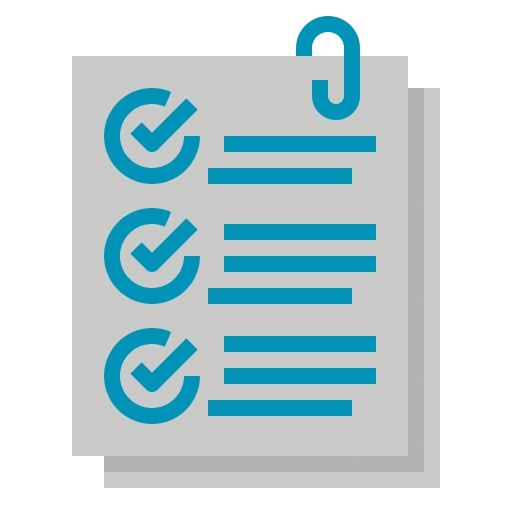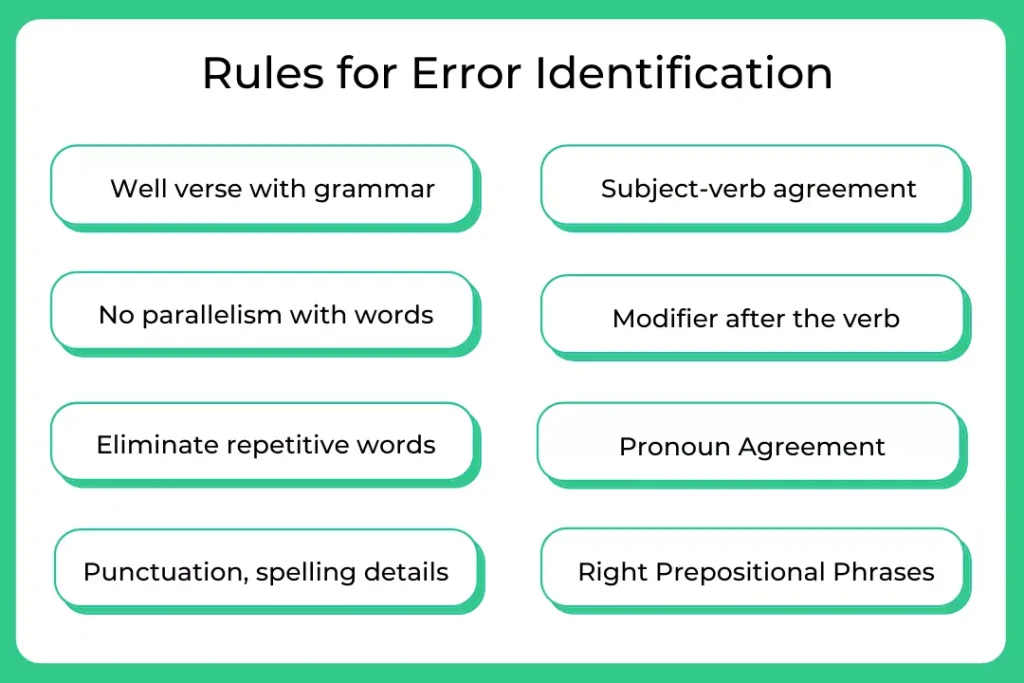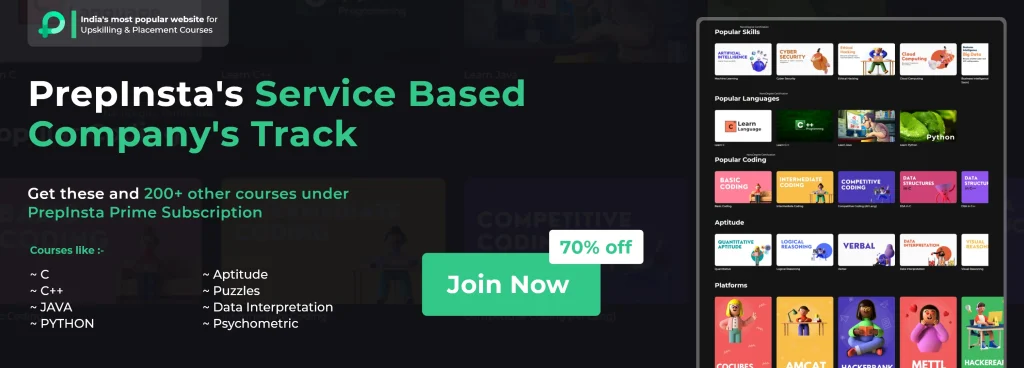Verbal Menu
- Basic Grammar
- Speech and Voices
- Tenses
- Articles
- Tenses and Articles
- Idioms and Phrases
- Subject Verb Agreement
- Prepositions and Conjunction
- Selecting Words
- Relative Pronoun
- Sentence Completion
- Sentence Ordering
- Contextual Vocabulary
- Jumbled Sentence
- Sentence Formation
- Error Identification
- Sentence Improvement and Construction
- Cloze Test
- Fill in the blanks
- Paragraph Ordering
- Para Jumbles
- Synonyms and Antonyms
- Synonyms
- Antonyms
- Reading Comprehension
- Get Off-campus Drive Updates
- Get Hiring Updates
- Contact US
PREPINSTA PRIME
Rules For Error Identification
Rules for Error Identification
Rules for Error identification is a combination of all the elements that fall the umbrella of Grammar. It is a type of competitive test where one needs to identify the grammatical errors in a sentence. Though termed as Sentence Correction, most often, problems in this topic need one to only classify sentence errors.
It can be a punctuation error, wrong use of tense, subject-verb disagreement and more, through which a reader’s skills are tested. Error questions can be tough for people appearing for competitive exams.

Rules For Error Identification
The following rules for error identification should be kept in mind while solving any questions:
1. You should be well-versed with the parts of speech, such as adverb, adjectives, conjunctions, nouns, interjections, etc.
- These must be correctly used as they help to make a sentence constructive.
- Example:
She cooks real good. (Incorrect)
She cooks really well. (Correct)
2. Make sure the sentence is grammatically appropriate, where the subject must agree with the verb.
- The subject-verb agreement should there, if not, then the sentence has an error. It also acts as a hint for finding an error.
3. There should be no parallelism within the sentence. Various words in the sentence should follow the same concept where all are written in the same tense.
- Example:
Students must go through programming, computing and how to process.(Incorrect)
The student must go through programming, computing, and processing. (Correct)
4. A modifier is something which should come after subject as it modifies the subject. The sentence can be wrong if the modifiers are placed before the subject.
- Example:
Swamped in mud, Jai rescued the puppy. (Incorrect)
Swamped in mud, the puppy was rescued by Jai. (Correct)
5. The sentence must not include repetitive words or redundancy.
- Example:
He will return back next week. (Incorrect)
He will return next week. (Correct)
6. Several grammatical, punctuation, and spelling details or knowledge is a must have for the people appearing for error identification test.
7. Pronoun agreement should be there, such as he/she/it should go with does or ‘es’ and you/we/they must go with doing.
8. A verb followed by a preposition typically forms a phrasal verb.
- Phrasal verb mistakes happen when a dissimilar preposition is used in place of the one that is required to be put.
- It is required to have knowledge about phrases and idioms as they have some specific words.
- One can easily identify errors in phrases if they have thorough knowledge about the phrases.
9. Use of correct words at correct places is important. It may also help you find a logical replacement of the word in mind through which you can identify that the sentence has errors to be replaced.

Prime Course Trailer
Related Banners
Get PrepInsta Prime & get Access to all 200+ courses offered by PrepInsta in One Subscription
Some Extra Rules for Error Identification
1. Use of Question Tags:
Question tags are the short clauses in the end of a statement that turn a statement into question. These questions are formed by the auxiliary verb that are used in the first clause.
Example:
The birds were flying in the same direction, weren’t they?
Here, ‘The Birds were’ is the subject and verb used, hence the question tag will be ‘weren’t they’
2. Use of Relative Pronoun:
Relative Pronouns are used to show a relation between the dependent and the independent clause. The 5 most common Relative Pronouns are:
- who
- whom
- that
- which
- what
Example:
The boy who scored the highest marks is my best friend
Here, who is the relative pronoun that relates the dependent clause ‘the boy’ with the independent clause ‘the remaining sentence’.
3. Transitive and Intransitive Verb:
Transitive verbs will always carry the object with themselves while an Intransitive verb will never carry an object.
Example:
Transitive Verb:
The lawyer addressed the jury before the hearing began
Here, addressed is the transitive verb which needs the object ‘the jury’.
Intransitive Verb:
The patient’s health recovered quickly
Here, recovered is followed by an adverb instead of an object.
Example:
We will continue the hearing after a break. (transitive)
The hearing continued after the break. (intransitive)
Also Check Out
Common Areas Where Errors Are Found
- Tenses
- Subject-Verb Agreement
- Pronouns
- Articles
- Prepositions
- Word Order
- Modifiers
- Conditional sentences
- Verb forms
Error Identification Sample Questions
Question: 1
Read each sentence to find out whether there is any grammatical error in it. The error, if any, will be in one part of the sentence. The letter of that part is the answer. If there is no error, the answer is ‘D’.
- The construction of Chaar Minar
- started in the year 1672,
- and it spanned for 24 years.
- No errors
Correct Answer: “and it spanned for 24 years.”
Explanation:
he word ‘spanned’ is used to denote a longer period of time. Therefore, it is not required to add ‘spanned for’. Whenever we use the word ‘spanned’, no preposition will be used. So, the correct sentence will be ‘The construction of Chaar Minar started in the year 1672 and it spanned 24 years’.
Question: 2
Read each sentence to find out whether there is any grammatical error in it. The error, if any, will be in one part of the sentence. The letter of that part is the answer. If there is no error, the answer is ‘D’.
- Before she gets angry,
- Please listen to
- Is her explanation
- No errors
Correct answer: is her explanation
Explanation:
Before she gets angry, listen to what her explanation is – This should be the correct answer.
Since we are using ‘her explanation is’, we need to include what. We use what here as a determiner before a noun, the omission of which will leave the sentence incomplete
Question: 3
Read each sentence to find out whether there is any grammatical error in it. The error, if any, will be in one part of the sentence. The letter of that part is the answer. If there is no error, the answer is ‘D’.
- The Lupin web series
- is really binge worthy that I keep
- rewatching it always.
- No errors
Correct answer: rewatching it always
Explanation:
The Lupin web series is really binge worthy that I keep rewatching it. Rewatching means to watch it again and again. Therefore, ‘always’ is unnecessary.
Question: 4
Read each sentence to find out whether there is any grammatical error in it. The error, if any, will be in one part of the sentence. The letter of that part is the answer. If there is no error, the answer is ‘D’
- My father once said
- that I cannot get everything
- Go according to my wish lists in my life
- No errors
Correct answer: that I cannot get everything
Explanation:
My father once said that I cannot have everything go according to my wishlist in my life- This should be the correct answer.
According to this sentence, ‘get’ is an unsuitable word in the sentence, therefore, we will use ‘have’. The sentence talks about what you own, not what you will receive.
Question: 5
Read each sentence to find out whether there is any grammatical error in it. The error, if any, will be in one part of the sentence. The letter of that part is the answer. If there is no error, the answer is ‘D’
- I must tell you,
- You are extremely
- good at this
- No errors
Correct answer: No errors
Explanation:
I must tell you, you are extremely good at this. This sentence has its tense correct, subject verb agreement is present, i.e, subject and verb are both singular, and it has no grammatical or syntactical errors. Therefore, this sentence has no errors.
Also Check Out
Also Check:
- Basic Grammar – Questions | Rules | How to Solve Quickly | Tricks & Shortcuts
- Speech and Voices – Questions | Rules | How to Solve Quickly | Tricks & Shortcuts
- Tenses – Questions | Rules | How to Solve Quickly | Tricks & Shortcuts
- Tenses and Articles – Questions | Rules | How to Solve Quickly | Tricks & Shortcuts
- Idioms and Phrases – Questions | Rules | How to Solve Quickly | Tricks & Shortcuts
- Subject Verb Agreement – Questions | Rules | How to Solve Quickly | Tricks & Shortcuts
- Prepositions and Conjunction – Questions | Rules | How to Solve Quickly | Tricks & Shortcuts
- Selecting Words – Questions | Rules | How to Solve Quickly | Tricks & Shortcuts
- Relative Pronoun – Questions | Rules | How to Solve Quickly | Tricks & Shortcuts
- Sentence Completion- Questions | Rules | How to Solve Quickly | Tricks & Shortcuts
- Basic Grammar
Questions
Rules
How to Solve Quickly
Tricks & Shortcuts - Speech and Voices
Questions
Rules
How to Solve Quickly
Tricks & Shortcuts - Tenses
Questions
Rules
How to Solve Quickly
Tricks & Shortcuts - Tenses and Articles
Questions
Rules
How to Solve Quickly
Tricks & Shortcuts - Idioms and Phrases
Questions
Rules
How to Solve Quickly
Tricks & Shortcuts - Subject Verb Agreement
Questions
Rules
How to Solve Quickly
Tricks & Shortcuts - Prepositions and Conjunction
Questions
Rules
How to Solve Quickly
Tricks & Shortcuts - Selecting Words
Questions
Rules
How to Solve Quickly
Tricks & Shortcuts - Relative Pronoun
Questions
Rules
How to Solve Quickly
Tricks & Shortcuts - Sentence Completion
Questions
Rules
How to Solve Quickly
Tricks & Shortcuts
Get over 200+ course One Subscription
Courses like AI/ML, Cloud Computing, Ethical Hacking, C, C++, Java, Python, DSA (All Languages), Competitive Coding (All Languages), TCS, Infosys, Wipro, Amazon, DBMS, SQL and others

 Apply For Jobs
Apply For Jobs Get Hiring Updates
Get Hiring Updates




Login/Signup to comment